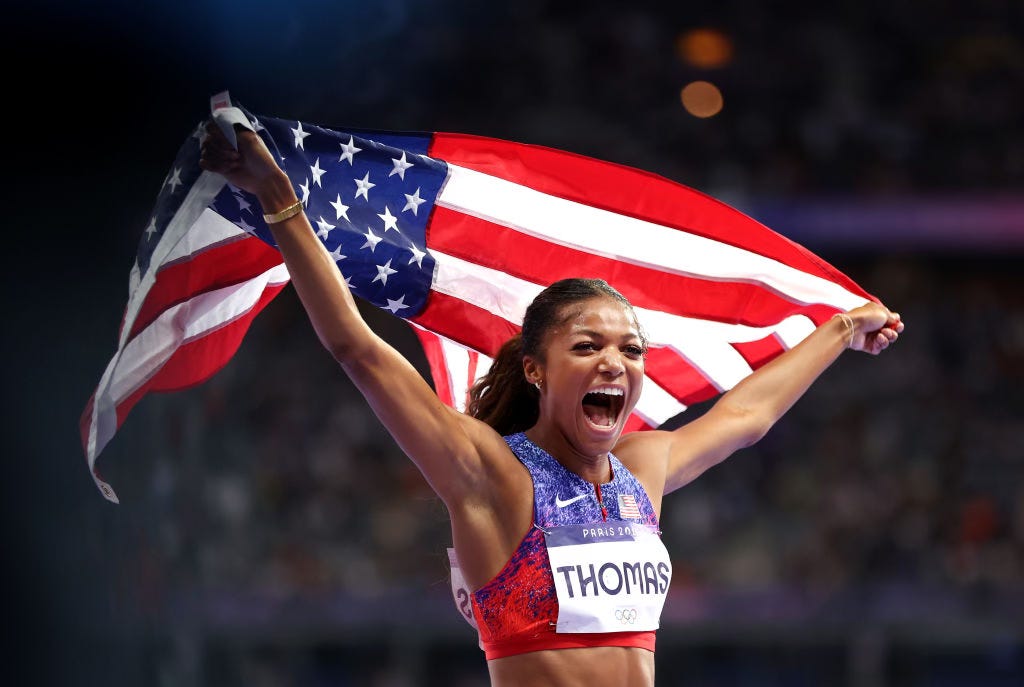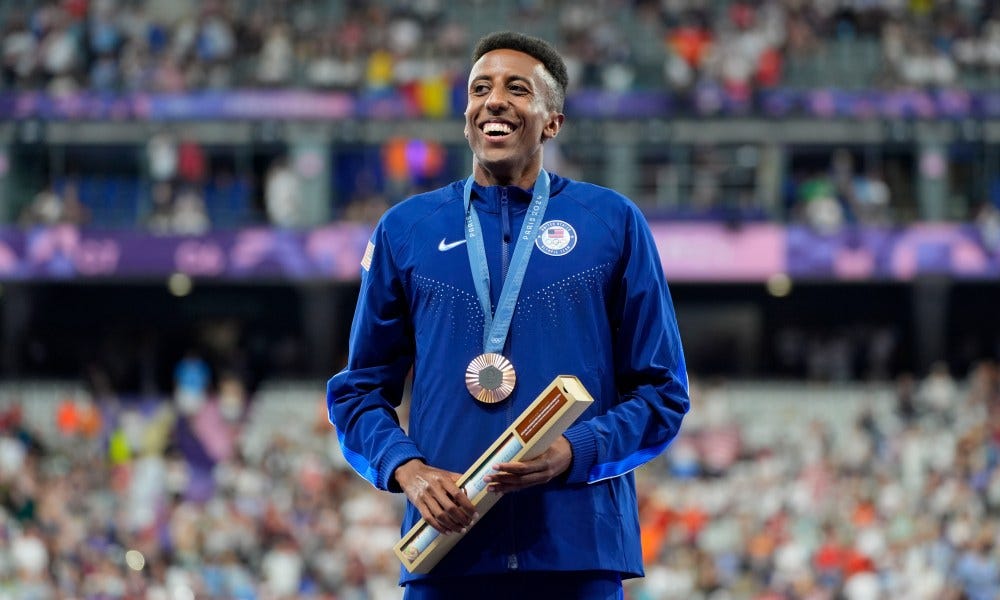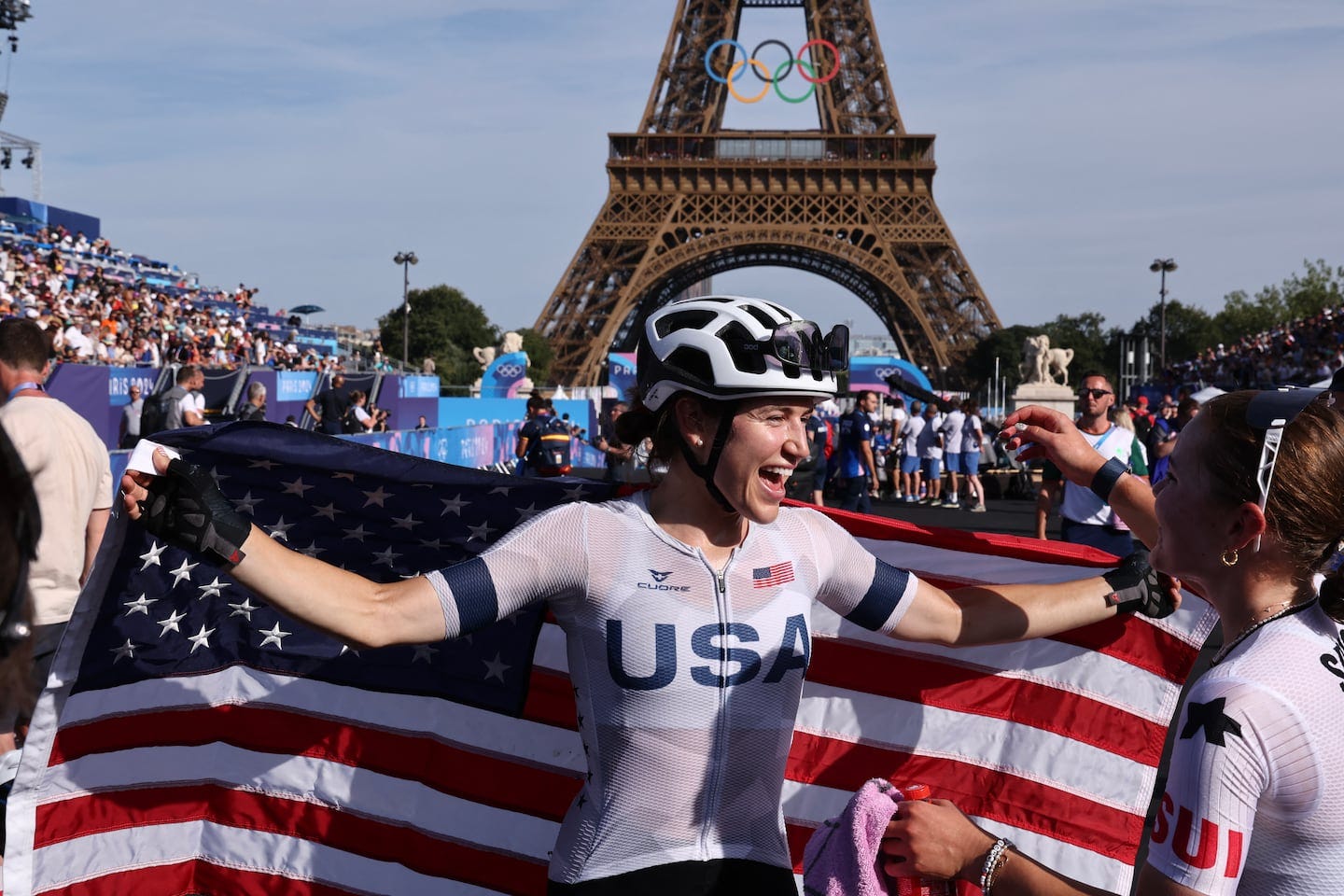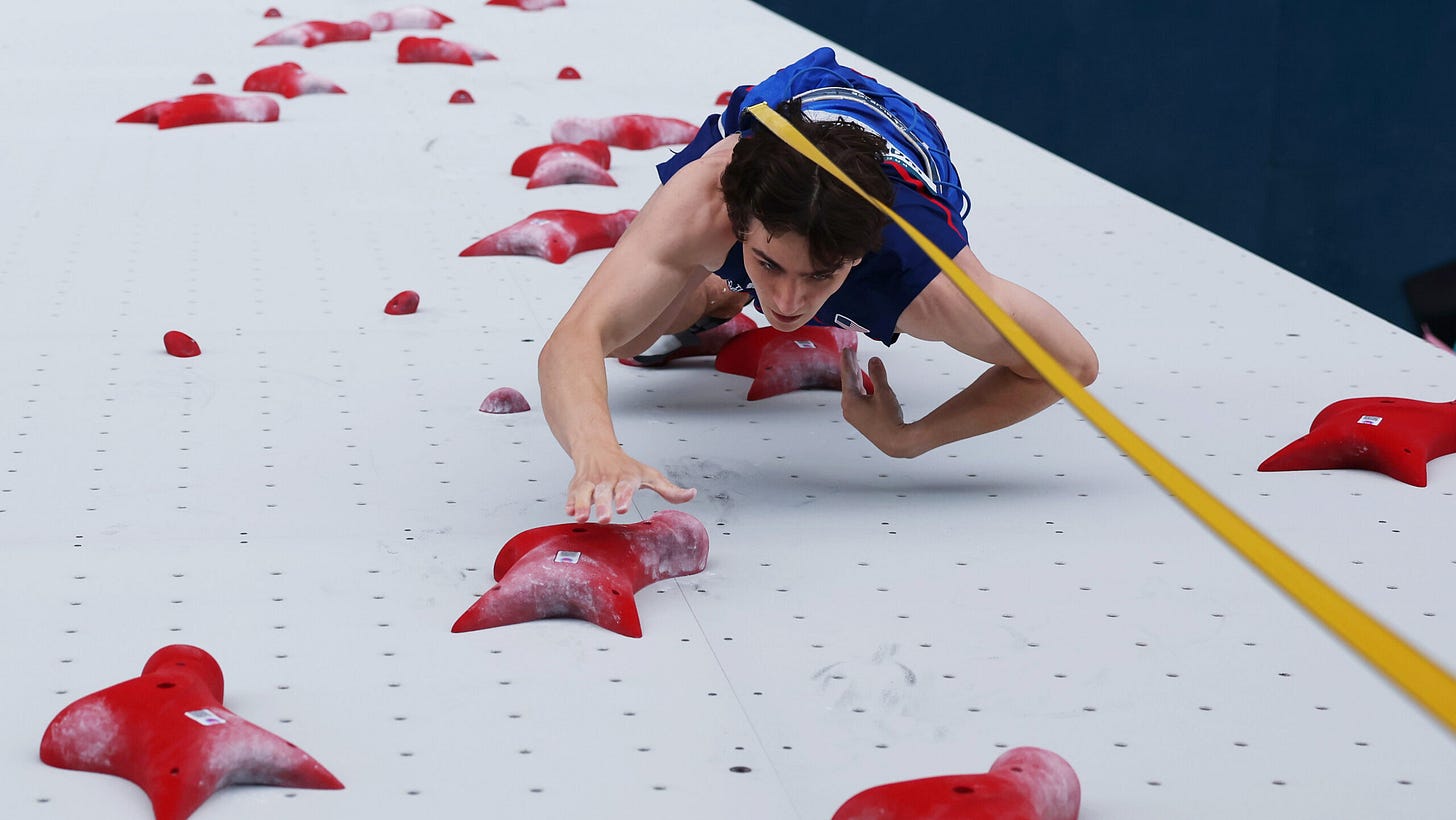Another week, and once again, there’s plenty more Olympic magic. We wrapped things up at the pool and the gym and turned our attention to the track. Along the way, in one of the most moving moments of the games so far, Novak Djokovic finally won a gold medal for Serbia, trembling with emotions afterwards. Noah Lyles came back to win gold in the 100-meters by less than the amount of time it takes to blink. The final straightaway of the men’s 400-meter race can only be described as thunderous. If you haven’t yet, you have to watch.
And of course, there were the stories: inspiring, stirring, reaffirming about the power of sports. Just like last week, we couldn’t narrow it down to one. So we’re sharing a smattering of our favorite moments from the past week. Enjoy!
The Scholar Sprinter
For my money, the 200-meter sprint is among the most electric sporting events on the planet: long enough to experience a full novel’s worth of drama yet short enough to keep you from even wanting to blink. On Tuesday, American sprinter Gabby Thomas powered out of the blocks and then, at the turn, pulled ahead to win gold. It was an electrifying performance, worthy of a write-up here on the basis of the run itself.
But Thomas’ backstory is pretty incredible too.
She went to undergrad at Harvard, and when she wasn’t too busy winning a whopping 22 Ivy League titles and setting conference records in the 100-meters, 200-meters, and 60-meters, she somehow found the time to double major in neurobiology and global health. She went pro after three years, then moved to Austin, TX, to train with Tonja Buford-Bailey, a former Olympic hurdler who runs an elite track club for Black women. “It was something so special about being in a group of Black women and having a Black coach because I could really see myself in their shoes,” Thomas told Runner’s World. “I felt like I could do what they were doing.” With Bailey’s instruction and community, Thomas’ times kept getting faster and faster.
That’s not all. In Austin, she also enrolled at the University of Texas to earn a graduate degree in public health. Thomas says she has dreams of one day running a hospital, helping marginalized communities gain equal access to healthcare. And so, after practice, Thomas volunteers at a medical clinic in Austin that helps uninsured patients, leading their hypertension program. She helps people with high blood pressure change their lifestyle. “I get to know them and their barriers to getting healthcare, what they’re struggling with, their barriers to exercising or eating healthy, what stresses them out,” Thomas said.
Do you think Thomas could help figure out why my blood pressure skyrocketed while watching that 200-meter race?
Will Run for McDonald’s
Perhaps you’ve seen the men’s 1500-meter final by now, a race that’s already been deemed as legendary. Norway’s Jakob Ingrebrigtsen and England’s Josh Kerr were considered the heavy favorites and led most of the way. But in the final lap, Americans Cole Hocker and Yared Nuguse surged, finishing in first and third respectively.
It wasn’t just that the result was surprising—though it was. For Nuguse in particular, the fact that he was racing at all would have been a huge shock just a few years ago.
In high school, Nuguse wasn’t on the track team. He was actually a member of the bowling team. Yes…bowling. But in PE class, there was a rule that everybody had to run a mile before they would be dismissed for lunch. This directive lit a fire under Nuguse; he wanted to finish as quickly as possible so he could beat the lines at McDonald’s. He consistently finished the mile in 5:30 with no training.
We’ll let Nuguse take the story from here: “My PE teacher tells the track coach, ‘There’s this kid, you should talk to him,’ yada yada,” Nuguse said. “And he comes and finds me in my classes and is just like, ‘Can I speak to Yared?’ And pulls me out and tries to like be like, ‘Oh, you should really join, it’d be really fun,’ and yada yada yada. I was like, ‘I don’t know. We’ll see.’ He was pretty persuasive, and eventually I came around.”
He won state titles, and by graduation, clocked a mile time of 4:06. At Notre Dame, he won the NCAA 1500-meter title as a sophomore. That’s when, for the first time, he realized he was actually pretty good. He studied dentistry and says he has always wanted to become an orthodontist. He says now that he’ll run until he’s 30. Then, he’s going to dental school.
But maybe that nonchalance, evidenced even at the beginning of his journey to the podium, is part of Nuguse’s secret. “I think it really helps me come to a race—and come to my running in general—by being like, ‘This isn’t my whole life. I have stuff to do after,’” Nuguse said.
> Indiana Hoosier Cole Hocker won gold in that 1,500-meter race in spite of entering as a 21-to-1 underdog. David Woods wrote a story on how Hocker pulled it off in the Indianapolis Star, that reminded me of the magic of the local sports page.
Like These Stories? There’s More Where They Came From!
If you’re a fan of these types of stories, you’ll love Religion of Sports the book! ROS co-founder Gotham Chopra and I wrote it last year, sharing little-known stories and wisdom from many of the greatest athletes of all-time.
And yes, that means there’s a lot of Olympics stories.
We take you inside the Tokyo hotel room where Simone Biles struggled with the twisties in 2021. We track how one woman’s tenacity gave women the right to run the marathon in the 1984 Games. And if you’re a Winter Olympics fan (like me!), we go deep on why Lindsey Vonn thought her greatest race was actually one that earned her a bronze.
It All Started With a Bike Ride in Central Park
The journey to the Olympics is one that takes a lifetime. At least, that’s what they tell you. For Kristen Faulkner, though, things are a literally bit different.
Faulkner grew up in Homer, Alaska, where her parents owned a resort called “Land’s End.” She made beds, pulled weeds, and waited tables, and in her free time, she would hike and row. She rowed well enough to earn a spot on the Havard rowing team. After graduation, in typical Harvard fashion, Faulkner took a job working for a venture capitalist in New York.
This was in 2017, and starved for an outdoor activity, Faulkner signed up for a cycling clinic in Central Park. Back then, seven years ago, she didn’t know how to clip her cycling shoes into her pedals. By 2020, she was racing professionally. And then, this fall, she nearly qualified for Team USA in the road race, a 97-mile race through the streets of Paris.
Faulkner finished third in qualifiers, when only the top-2 riders advance. A month ago, however, one of the riders pulled out of the competition. That meant Faulkner was heading to Paris.
Nobody expected much from her, or any American. No American has won any medal—let alone a gold—in the cycling road race since 1984. But with about three miles to go, Faulkner made a bold move, sprinting ahead of the leading pack of racers, and she never looked back. She won gold, finishing nearly a minute ahead of the the silver medalist. “I took a really big risk a few years ago to come to pursue my dream,” Faulkner said. “I made it happen when a lot of people didn’t believe.”
> The Wall Street Journal, naturally, was interested in Faulkner’s venture capitalist backstory. She told them how the work inspires her cycling. “A lot of what I learned to do is how to take calculated risks, how to assess risk,” she told the paper. “If there’s high risk but the reward is high, it might be worth it…What is the risk-reward of being patient versus being aggressive? That’s something I definitely take with me.” Read their story here.
The Climber’s Gambit
The American rock climber Sam Watson set a world record in speed climbing on Thursday. But he only won bronze.
That’s because the 17-year-old Watson’s record climb came in the bronze medal match, not the semifinal he needed to win to compete for gold. While watching his climb, though, I found myself considering this strange sport. It’s about power, speed, but also, a heavy dose of geometry. How do you scale a rock wall in under 5 seconds? It starts with picking the perfect route: Do you go left or right? You only have a fraction of a second to decide.
In fact, pattern recognition was a key part of Watson’s training regimen. Along with stretching, weight training, and a whole lot of climbing, Watson dedicates time to blitz chess, where every move must be made within three minutes. He even has a drill where he races another climber up a wall, then plays a round of chess—each competition is worth one point and first to seven wins. “When you’re playing blitz, you’re really moving off intuition,” Watson told the Wall Street Journal. “You’re thinking about it, but you’re also thinking about your time: How can I make the best move—or close to the best move—without making a mistake?”
In the Olympic Village, Watson has brought a chess board to the dining hall, along with a sign. It’s written in seven languages. Anyone want to play?
> Here’s a bonus speed climbing tid-bit. Poland’s Aleksandra Miroslaw won gold in the women’s competition. In her hometown of Lublin, she has one of the coolest murals I’ve ever seen.
Gonna Win Gold? Do It For the Philippines.
Did you know that any member of Team USA that earns a gold medal wins a cash prize of $37,50o? It’s not NBA Super Max money, but it’s still pretty good. Let me make a suggestion, though. If you’re thinking of attempting to win a gold medal, do it for the Philippines.
Before these Olympics, no Filipino man had ever won a gold medal. That all changed when gymnast Carlos E. Yulo won gold in the floor exercise and vault. The two golds might be the worst prize Yulo has received as a result.
First came the cash. The country’s government gifted Yulo 10 million Philippine pesos ($172,519 USD). But that wasn’t enough. Then Congress passed a measure to send him an additional 6 million pesos ($103,511 USD, to bring the cash total to $276,030 USD).
Then private companies started to add to the bounty. A local developer gifted Yulo a two-bedroom condo valued at $414,046 USD in the coastal town of Taguig. The University of Mindanao offered him free college credits. Local restaurants—including a Korean fried chicken chain and a ramen joint—offered him free food for life. A gastroenterologist even offered free colonoscopies for life. Nice!
Yulo is from Manila, the largest city in the country, and its mayor recently told the BBC that they are preparing to welcome Yulo home with a ‘hero’s welcome.’ We can’t wait to see just how wild a reception it is.
> How much is a physical gold medal worth? An Oxford economist found out.
🐐 Here’s my pitch to get you to watch this week’s episode of In the Arena: Serena Williams. Roger Federer on Serena Williams. And Serena Williams on Roger Federer. Need I say more? Watch now on ESPN+.
⚾ Former Yankees second baseman Robinson Cano last played in the MLB two years ago. He made $252,057,791.00 in his 17-year career. So what is he doing playing in the Mexican league at 41? The Athletic’s Rustin Dodd goes to Mexico City to find out.
🍻 Women’s sports are—finally!—having a moment. One of the hubs of the movement is a sports bar in Portland, OR, that only airs women’s games. It’s called The Sports Bra. This is its story.
🤯 Maybe you watched some of the shooting events in the Olympics this week. Allow this awesome Texas Monthly story to introduce you to Elizabeth “Plinky” Toepperwein, the sharpshooter who was better than Annie Oakley, and who, “peeled potatoes with bullets and shot cigarettes out of her husband’s mouth.”












